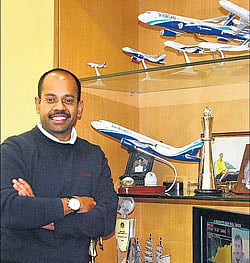
It may perhaps not get bigger than this. India’s young low-cost carrier IndiGo created a sensation in the international airline market on January 12 when it announced signing of the biggest ever single order of 180 aircraft valued at a whopping $15 billion (Rs 67,800 crore) with European plane maker Airbus.
As per the MoU signed with the Toulouse-based aircraft manufacturer, 30 of the 180 planes will be the largest selling A320s while the rest 150 will be the new A320neo (new engine option) which are more fuel-efficient machines. The delivery will start from 2016 and go on till 2025.
The order for 180 planes (the engines are yet to be decided) is no doubt huge but then, IndiGo is no stranger to dramatic announcements. When the Indian aviation market was just opening up about five years ago, InterGlobe, stunned the airline world by inking MoU for 100 Airbus A320 planes. Of those 100, IndiGo currently has a fleet of 34 Airbus A320s, flying to 24 destinations through 221 daily flights. The latest announcement means that 241 aircraft will be delivered to IndiGo by Airbus between now and 2025.
More good news
Good times are coming the IndiGo way in droves. Or so it seems. Recently released civil aviation ministry figures revealed that the budget carrier has emerged a joint second in terms of the Indian domestic market share. This was followed a day later by the government giving it permission to fly abroad after it completed the mandatory five years of domestic operations.
Interestingly, the twin orders of 100 and 180 planes is more than half of the 420 aircraft currently in service with all Indian carriers, including Air India, Jet Airways, Kingfisher Airlines, SpiceJet , IndiGo and GoAir, put together. The fleet size of IndiGo is set to reach 50 in a year’s time while its 100th will reach India by 2015.
IndiGo will also be the launch customer for the A320neo. An airline takes considerable risk if it wants to become launch customer but then it also reflects the faith a carrier has in the manufacturer. What’s special about A320neo? The aircraft, according to Airbus, has specially designed wing tips — called Sharklets — that will reduce the aerodynamic drag which develops at the wingtips of a moving aircraft leading to fuel savings of up to 15 per cent. The ‘neo’ will also have a reduced engine noise.
“This order for industry leading fuel efficient aircraft will allow IndiGo to continue to offer low fares,” said IndiGo co-founders Rakesh Gangwal and Rahul Bhatia. “Ordering more A320s was the natural choice to meet India’s growing flying needs. The opportunity to reduce costs and to further improve our environmental performance through the A320neo was the key to our decision.” Airbus Chief Operating Officer Customers John Leahy said: “The A320neo, offering maximum benefit for minimum change, will ensure that this continues to be the case for many years to come. This order positions IndiGo to take full advantage of the predicted growth in Indian air travel.”
IndiGo president Aditya Ghosh, who led the protracted negotiations, said: “We are looking at a 20-year kind of relationship with Airbus.” This aircraft will allow IndiGo to continue to offer low fares, said Rahul Bhatia, Group Managing Director, InterGlobe Enterprises, the promoter company of the airline. “You need more planes coming into the country even at the current load factors and demand.
That is just not happening. I think that fares should come down so that more people can fly,” Ghosh said, adding, “The question is really on the cost side. So we have to see how well we can control our cost so that despite the fact that fares will come down, we will still be able to run a profitable business,” he said. “With this order, IndiGo has given a kick-start to aviation industry coming out from a down-cycle,” said Airbus Marketing and Contracts Executive Vice-President Kiran Rao.
No clear funding option
All this is fine but from where will the airline fund the mega project of the massive $15 billion order? IndiGo, an unlisted company owned by InterGlobe Enterprises and industry veteran and US-based Rakesh Gangwal, a former chief executive of US Airways, is in the process of selling shares in an initial public offer (IPO). However, it has not made its plans public. “No decision has been made as yet. You can’t run a business without considering various financing options with this (IPO) being one of them but it’s too early for me to comment,” Ghosh says. According to market sources, Indigo is likely to come out with IPO shortly for about Rs 4,000 crore.
The airline is tightlipped over the details of the payment, even for the first batch. Most airlines use ‘sale and lease back’ mode to leverage their cash flow. Under this arrangement, the aircraft owner sells the aircraft to the lender or lessor who then immediately leases the aircraft back to the original owner.
There will be no interruption or disruption of aircraft operations, but the transaction will give the company some extra cash. If the market is performing better, airlines make a profit of $3-4 million on a plane, since the price would have risen since the order date. On wonder many of Indigo’s present fleet are on lease.
Quick take-off
In a span of a mere five years, the budget carrier has risen from being a start-up airline to the joint second position in terms of market share for December, 2010 with Kingfisher. The two airlines for that month had a market share of 18.6 per cent each behind the 25.4 per cent market share of the market leader Jet Airways-JetLite combine. The national carrier Air India has been pushed down to third position in domestic market.
IndiGo, carried 9.71 lakh passengers in December, 2010 as against 13.23 lakh by Jet Airways-JetLite combine, 9.72 lakh by Kingfisher and 8.9 lakh by AI (domestic). It recorded the highest seat factor of 93 per cent in December 2010, followed by other no-frill carriers SpiceJet (88 per cent ), GoAir (87 per cent) and JetLite with 85 per cent This was a major factor for IndiGo increasing its market share despite having just 34 planes compared to the other major players such as AI, Jet and Kingfisher.
IndiGo, which recently received the best safety award from the Bangalore International Airport Limited, has been amongst the best on-time performances (OTP). In 2010, its OTP was 85 per cent, second best in the industry next only to Kingfisher’s 86 per cent.
Of course the growing market did help. The year 2010 saw a near 20 per cent jump in air traffic to 5.20 crore from 4.38 crore in 2009. “There is a fundamental demand for air travel and more so for low-fare air travel,” Ghosh said. “If we take a longer term view, we definitely see passenger traffic and demand increasing.”
Shortly, IndiGo will take to international skies - it has been permitted to operate daily flights to Bangkok, Singapore and Dubai from New Delhi and Mumbai, besides connecting Muscat with Mumbai, all considered to be high-traffic routes. The government has chosen these routes out of the 15 that IndiGo proposed. The clearance means that the budget airline will be pitted against Emirates, Singapore Airlines Ltd and AirAsia Bhd. With this, Indigo joins four other airlines - Air India, JetLite & Jet Airways, Kingfisher and SpiceJet in flying abroad.
“As IndiGo turns five in August 2011, this approval dovetails well into its planning process. This will hasten the process of Indian carriers taking back some of the market share that has been lost over the past many decades to foreign carriers,” the airline said in a statement.
The huge indigo order has only carried forward the fleet orders placed by its competitors, as the market is growing by over 10 per cent. Now owned by Chennai entrepreneur Kalanithi Maran, IndiGo’s main rival SpiceJet last November ordered 30 NextGen turboprop aircraft from Canada’s Bombardier for as much as $915 million.
The national carrier, Air India, had earlier placed an order for 111 Boeing and Airbus aircraft for $11 billion in 2005. Kingfisher, which has a mix of Airbus family fleet and ATR, currently has 60 aircraft in its fleet and has ordered for 130 more. Jet Airways has not placed any fresh orders yet as it is to take delivery of the Boeing 787 Dreamliner, which is getting delayed. Air India too is to receive its 27 Dreamliners it has ordered.
Large acquisition of aircraft shows the kind of growth potential in the Indian commercial airspace. The massive order of Indigo is an indication that it wants to fly above the rest on that growth trajectory.


